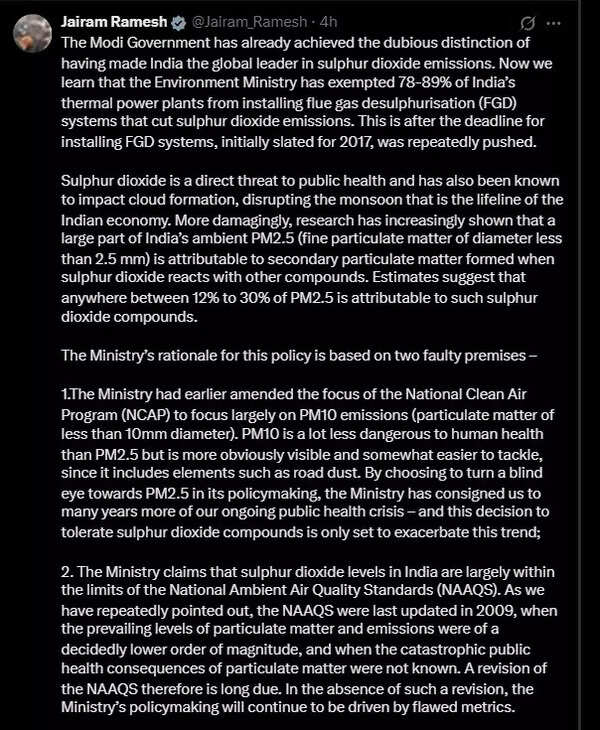‘Centre choosing easy over effective’: Congress’s Jairam Ramesh slams rollback of sulphur norms; alleges government caved to polluter pressure | India News

NEW DELHI: Congress leader Jairam Ramesh on Sunday criticised the Modi government for exempting most coal-fired power plants from installing pollution control systems, calling the decision “dangerous” and based on “faulty premises.” The environment ministry’s new order, passed Friday, exempts 78–89% of thermal power plants from using flue gas desulphurisation (FGD) systems, which cut sulphur dioxide (SO₂) emissions.“The Modi Government has already achieved the dubious distinction of having made India the global leader in sulphur dioxide emissions,” Ramesh posted on X. “Now we learn that the environment ministry has exempted 78–89% of India’s thermal power plants from installing FGDs.”

.
The former environment minister further said SO₂ harms public health and affects monsoon patterns. “Research has increasingly shown that a large part of India’s PM2.5 is due to sulphur dioxide reacting with other compounds,” he added. Ramesh also hit out at the ministry for shifting focus from PM2.5 to the less harmful PM10, just because it’s more visible and easier to control. “By turning a blind eye to PM2.5, the ministry has consigned us to many more years of public health crisis.”The senior Congress leader also slammed the continued use of outdated 2009 air quality norms. “Without revising the NAAQS, policymaking will continue to be driven by flawed metrics,” he said.‘Delayed FGD worsening crisis’: ResearchMeanwhile, a recent research by IIT Delhi and IIT Bombay, reviewed by the Centre for Research on Energy and Clean Air (CREA) says that India’s air pollution is largely driven by secondary PM2.5 particles formed when sulphur dioxide and other gases react in the atmosphere. According to IIT Delhi, about 81% of this pollution is home-grown, with the power sector alone responsible for 11% of population-weighted exposure. It said that despite clear evidence linking SO₂ emissions to public health risks, FGD implementation in coal plants remains patchy, delayed, and widely ignored.





